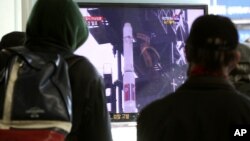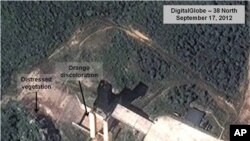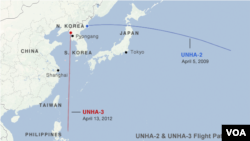North Korea appears to have taken apart and moved its long-range rocket, a day after announcing that technical difficulties had caused a one-week delay of its launch.
South Korea's Yonhap news agency quoted a military source as saying satellite photos suggest technicians have disassembled the three-stage rocket and moved it to a nearby assembly facility.
The unidentified source said North Korea pulled the rocket from the launch pad to fix technical problems.
Moving forward
Pyongyang has vowed to proceed with the launch, despite widespread international condemnation, a long period of cold weather and technical difficulties.
On Monday, North Korea extended the deadline of the rocket launch by a week, until December 29, citing a "technical deficiency in the first stage control engine module of the rocket."
The launch had been scheduled for December 10-22 to coincide with the first anniversary of the death of former North Korean ruler Kim Jong Il.
South Korean Foreign Ministry spokesperson Cho Tai-young said Tuesday there is rising international pressure on North Korea to scrap the launch.
"Currently, 29 governments and three international organizations, including the United Nations, European Union and NATO have released statements insisting that North Korea suspend its missile launch," Cho said.
UN ban
North Korea is banned from carrying out any missile or nuclear-related tests by United Nations resolutions imposed in 2006 and 2009 after it conducted unsuccessful nuclear tests. A third rocket launch, in April, also ended in failure and was condemned by the Security Council.
Bruce Klingner, a senior research fellow at the U.S.-based Heritage Foundation, tells VOA that whether the latest launch succeeds or fails, it is a significant development if it takes place at all.
"If it does succeed, then it will seemingly be an overnight security threat," said Klingner. "If it fails, people will dismiss it as not a security threat or military threat. But at some point they will get it right, just as the U.S. had many failures early on in our missile and rocket programs."
Pyongyang insists this launch is simply to put a weather satellite in orbit. The United States, Japan and South Korea view the tests as platform to develop a ballistic missile capable of delivering a nuclear warhead.
South Korea's Yonhap news agency quoted a military source as saying satellite photos suggest technicians have disassembled the three-stage rocket and moved it to a nearby assembly facility.
The unidentified source said North Korea pulled the rocket from the launch pad to fix technical problems.
Moving forward
Pyongyang has vowed to proceed with the launch, despite widespread international condemnation, a long period of cold weather and technical difficulties.
On Monday, North Korea extended the deadline of the rocket launch by a week, until December 29, citing a "technical deficiency in the first stage control engine module of the rocket."
The launch had been scheduled for December 10-22 to coincide with the first anniversary of the death of former North Korean ruler Kim Jong Il.
South Korean Foreign Ministry spokesperson Cho Tai-young said Tuesday there is rising international pressure on North Korea to scrap the launch.
"Currently, 29 governments and three international organizations, including the United Nations, European Union and NATO have released statements insisting that North Korea suspend its missile launch," Cho said.
UN ban
North Korea is banned from carrying out any missile or nuclear-related tests by United Nations resolutions imposed in 2006 and 2009 after it conducted unsuccessful nuclear tests. A third rocket launch, in April, also ended in failure and was condemned by the Security Council.
Bruce Klingner, a senior research fellow at the U.S.-based Heritage Foundation, tells VOA that whether the latest launch succeeds or fails, it is a significant development if it takes place at all.
"If it does succeed, then it will seemingly be an overnight security threat," said Klingner. "If it fails, people will dismiss it as not a security threat or military threat. But at some point they will get it right, just as the U.S. had many failures early on in our missile and rocket programs."
Pyongyang insists this launch is simply to put a weather satellite in orbit. The United States, Japan and South Korea view the tests as platform to develop a ballistic missile capable of delivering a nuclear warhead.












